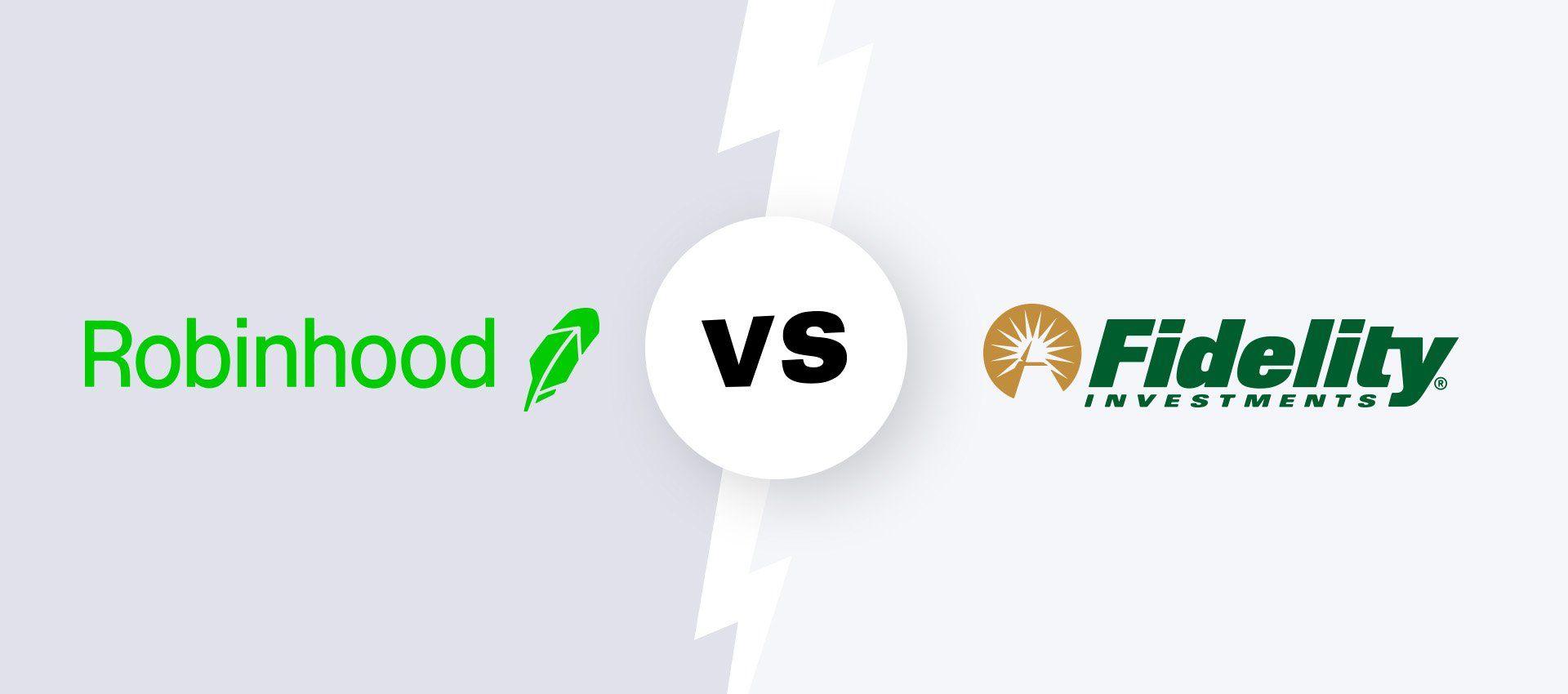
Robinhood vs. Fidelity: Which online broker is best?
Moneywise.com / Moneywise.com
We adhere to strict standards of editorial integrity to help you make decisions with confidence. Please be aware that some (or all) products and services linked in this article are from our sponsors.
We adhere to strict standards of editorial integrity to help you make decisions with confidence. Please be aware that some (or all) products and services linked in this article are from our sponsors.
Financial services companies Robinhood and Fidelity are on two different ends of the spectrum when it comes to, oh, just about everything.
The former is an online brokerage that was created to disrupt the traditional financial industry with commission-free trades and an easy-to-use mobile/web interface. The latter is a well-established, tried-and-true powerhouse brokerage with myriad tools and resources.
Read our Fidelity vs. Robinhood comparison to get the facts before deciding which broker best suits your investing needs.
The short version
- Robinhood is easy-to-use, making it great for beginner investors and traders.
- Fidelity offers more investment options and research tools than Robinhood.
- Both brokers offer commission-free stock and ETF trading.
- Robinhood is better for trading options, low margin rates, and also supports crypto.
- Fidelity supports investments like mutual funds and bonds/CDs unlike Robinhood.
Robinhood vs. Fidelity: overview
What is Robinhood?

In 2013, Vladimir Tenev and Baiju Bhatt founded Robinhood to provide an alternative to the high fees traditional brokers were charging for trades.
Obviously, Robinhood doesn’t actually rob from the rich and give to the poor. However, it's a cost-effective way to begin investing with little money. And the U.S.-based broker’s user-friendly platform is a major selling point.
Robinhood also offers commission-free trading on stocks, ETFs, and options. The platform also rolled out cryptocurrency trading in 2018. While it doesn't support as many assets as most crypto exchanges, Robinhood lets you invest in popular coins like Bitcoin and Ethereum starting with just $1.
What is Fidelity?

Financial services company Fidelity was founded in 1946. The U.S. broker is one of the most well-rounded and trusted brokers available. It offers financial planning and advice, trading and brokerage services, and many investment products.
Customers can trade stocks and ETFs without paying commissions just like Robinhood. You can also trade options for without paying commissions aside from a $0.65/contract fee, mutual funds, bonds, and CDs.
Furthermore, Fidelity is the first brokerage firm to offer a zero expense ratio index fund. The retail brokerage accounts and IRAs do not attract fees, and investors do not have to maintain minimum account balances.
The company also offers robust research and trading tools which are useful for more experienced, active investors. Fidelity’s strong customer service reputation makes it a go-to broker for many experienced investors.
Robinhood vs. Fidelity: key features
Robinhood key features
- Robinhood Gold account: Investors can sign up for Robinhood Gold to borrow money to execute trades. However, you must have at least $2,000 to get started, and you have to pay a $5 per month membership fee. This fee also covers access to robust market data and professional research.Commission-Free Trading: It’s hard to beat the price tag that comes with Robinhood’s platform: no fees for trading stocks, ETFs and options.
- Ease-of-use: The mobile app and website offer a streamlined experience without many extras.
- Cryptocurrency trading: Invest in crypto starting with just $1 and add digital assets to your portfolio.
- Virtual library: One of the reasons beginners might find Robinhood appealing is its virtual library, which provides straightforward info on all your investing basics – from crypto wallets to compound interest.
Fidelity key features
- Fidelity Go: This robo-advisor service provides investment and financial advice at a low or no cost, depending on your invested amount.
- Retirement accounts: Fidelity offers traditional IRAs, Roth IRAs, and rollover IRAs, making it an excellent choice for investors who want tax-advantaged retirement accounts.
- Robust research tools: There are plenty of research tools on Fidelity. These include advanced charting, flexible screeners, third-party and in-house research, and trading idea generators.
- Portfolio analysis: These tools help investors to keep tabs on their portfolios. Customers can quickly get an overview of their account balances, buying power, gains and losses, stock analysis, asset allocation, top positions and ratings, etc.
- Educational resources: Fidelity has a wealth of educational articles and videos and also offers one-on-one meetings with a professional coach..
Robinhood vs. Fidelity: available investment products
Both Robinhood and Fidelity offer stock, ETF, and options trading, as well as fractional shares. However, the two companies diverge in their other products.
Robinhood provides cryptocurrency trading – an asset class absent from Fidelity’s offerings. Granted, Fidelity plans on rolling out Bitcoin investing in 401(k) plans, but for now, crypto investing isn't an option.
On the other hand, Fidelity offers mutual fund trading, which is not supported on the Robinhood platform.
Fidelity investors have access to more than 10,000 mutual funds and a large selection of proprietary funds. Furthermore, Fidelity lets you invest in bonds, CDS, and precious metals. In contrast, Robinhood doesn't support bonds or CDs and only offers precious metal ETFs.
Here's a breakdown of Fidelity vs. Robinhood in terms of investing options:
| Investment | Fidelity | Robinhood |
|---|---|---|
| Stocks | Commission-free | Commission-free |
| ETFs | Commission-free | Commission-free |
| Options | $0.65 per contract | Commission-free |
| Mutual funds | Yes | Not available |
| Crypto | Not available | Yes |
| Bonds and CDs | Yes | Not available |
| Precious metals | Yes | Precious metal ETFs |
| Fractional shares | Yes | Yes |
| Robo-advisor | Yes | No |
Fidelity also provides tax-advantaged accounts and custodial accounts.
Robinhood lacks a robo-advisor service, which Fidelity provides via Fidelity Go. This affordable robo-advisor doesn't charge for investment accounts with balances under $10,000. There's no minimum balance requirement either, so it's a beginner-friendly robo-advisor option similar to companies like Betterment.
Winner: Fidelity is better for mutual funds, its robo-advisor, and investments like bonds/CDs. Robinhood is superior for commission-free options trading and crypto.
Robinhood vs. Fidelity: fees
Both Robinhood and Fidelity offer commission-free stock and ETF trading. Additionally, neither company charges brokerage account maintenance fees.
The main difference is that Fidelity charges $0.65 per option contract whereas Robinhood is commission-free.
Margin rates also work differently for each company. With Fidelity, margin rates start at 8.575% for balances under $25,000. This rate drops to 7.075% once you reach over $100,000 and can get as low as 4.250% with debit balances over a million.
For Robinhood, you need a Robinhood Gold account to trade on margin, which costs $5 per month and includes $1,000 of margin. Your margin rate over $1,000 is 3.5% which is much lower than Fidelity.
There are other slight fee differences for various account changes or banking transactions. For example, it's free to close your Fidelity account, while Robinhood charges you $75 to transfer your assets to another account. Fidelity also has fees for mutual funds outside the No Transaction Fee list and charges $32.95 for broker-assisted trades.
Winner: Fees are similar but Robinhood is better for options trading and has better margin rates.
Robinhood vs. Fidelity: mobile app
Both brokers offer full-featured mobile apps for Android and iOS devices. If you want to trade or manage your accounts while on the go, Fidelity and Robinhood have you covered.
Robinhood’s mobile app provides a simplified experience to cater to the needs of the newbie investor. On the other hand, Fidelity’s app may suit the experienced investor better since it offers advanced features such as the Active Trader Pro platform.
Winner: Robinhood's app is best for quick and easy trading while Fidelity's app has more trading tools.
Robinhood vs. Fidelity: customer service
Fidelity has a slight edge over Robinhood when it comes to customer service. Current and prospective customers have access to phone support, email support, and live chat. In addition, customer support is available 24/7.
Conversely, Robinhood only provides email and 24/7 phone support. To its credit, customer service has a fast response time.
Winner: Fidelity has more comprehensive customer service options.
Robinhood vs. Fidelity: security
Robinhood security features include two-factor authentication, data encryption and the Transport Layer Security (TLS) protocol for communication between Robinhood’s mobile and web applications and servers. Investors’ stock, cash, funds, and ETFs are insured with SIPC in case anything ever happens to the platform. Also, traders can log in and disconnect any unknown devices from their accounts.
Fidelity's security features are similar to Robinhood's. However, Fidelity has the edge over Robinhood when it comes to reliability. The platform has not had any serious issues relating to security threats or data breaches. In contrast, Robinhood experienced a serious security breach in 2021.
Winner: Fidelity has a better track record for security than Robinhood.
Robinhood pros and cons
Pros
- Ease-of-use: The website trading platform and the Robinhood app are easy to understand, navigate, and use. This makes it an excellent choice for any beginner investor.
- Low fees: Robinhood traders don’t have to maintain a minimum balance on their trading accounts and Robinhood Gold accounts. Trading is commission-free for crypto, stocks, options, and ETFs.
- Free stock: New Robinhood users can get a free stock reward valued between $3 and $225 for opening an account.
- Crypto trading: Diversify your portfolio with digital assets like Bitcoin and Ethereum starting with just $1.
- Low margin rates: Robinhood has low margin rates, especially compared to Fidelity.
Cons
- No Bonds/CDs or mutual funds: While these safer investments might not interest every investor, their absence is a con for some investors.
- Limited crypto support: Robinhood only supports 11 cryptocurrencies. In contrast, exchanges like Coinbase and Gemini support 100+ coins.
- No crypto wallet: Currently, Robinhood users can't receive or send crypto to another wallet. Robinhood plans on launching a crypto wallet in the future, but for now, you have to sell your crypto for fiat if you want to withdraw it.
Fidelity pros and cons
Pros
- Well-established broker: Fidelity is one of the most trusted wealth management companies in the U.S., with robust security and privacy protection.
- Investment selection: Investors who want to diversify their portfolios have a huge range of investment options with Fidelity.
- Robo-advisor support: If you need a helping hand with investing, Fidelity Go is a beginner-friendly robo-advisor with no minimum balance requirements.
- Commission-free trading: Like Robinhood, Fidelity offers commission-free stock and ETFs trading. While it charges for bonds and CD trades, the fees are low at $1 per trade. And the $0.65 per-contract fee on options is similar to other top brokers.
Cons
- High margin rates: Investors pay higher margin rates with Fidelity (4.25% to 8.575% compared to Robinhood (3.5%).
- No crypto support: Fidelity is planning on Bitcoin investing for 401(k) accounts, but for now, it lacks digital asset support.
Robinhood vs. Fidelity: which broker is better for you?
So, how do you decide which company works for you? Ultimately, the choice comes down to what investment and account options you want from your broker plus available account types and tools.
Fidelity offers a more comprehensive platform compared to Robinhood’s bare-bones mobile app. If you're a buy-and-hold investor, you get all the trading tools you need to make informed decisions with Fidelity. The fact you can open retirement accounts and have more investment options are also two massive strengths.
Plus, active traders can use Fidelity’s Active Trader Pro to get trading tools you need to manage your risks and do all the customizations you need – most of these options are not available on Robinhood.
On the other hand, Robinhood is a great choice if you're a new investor who wants to learn stock market investing basics. The simple, user-friendly platform may not offer many research tools, but it's easy to navigate.
Lastly, Robinhood is better than Fidelity right now for options trading and cryptocurrency trading. You can't beat commission-free options, and Robinhood's crypto support expansion is promising. Just note that serious crypto investors should still use an exchange like Coinbase or Gemini instead for more crypto selection.
You can also explore more alternatives besides Fidelity or Robinhood below:
| Highlights | E*TRADE | TD Ameritrade | Webull |
|---|---|---|---|
| Rating | 4.8/5 | 4.5/5 | 4.3/5 |
| Minimum investment | $0 | $0 | $0 |
| Stock trades | $0/trade | $0/trade | $0/trade |
| Options trades | $0.65/contract | $0.65/contract | $0 |
| Crypto trades | ❌ | ❌ | ✅ |
| Mutual funds | ✅ | ✅ | ❌ |
| Virtual trading | ✅ | ✅ | ✅ |
| Reviews | E*TRADE Review | TD Ameritrade Review | Webull Review |
| Links | Open account | Open account | Open account |





